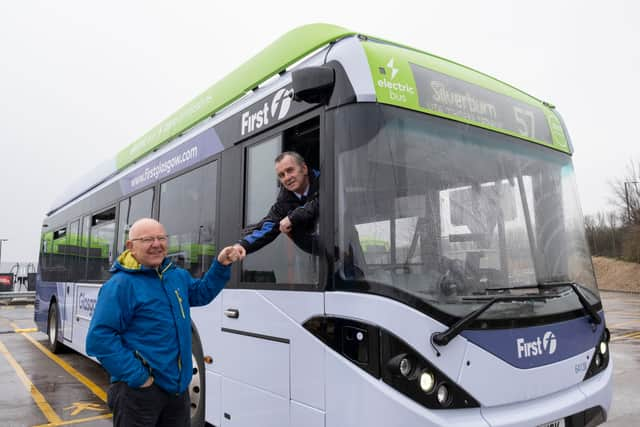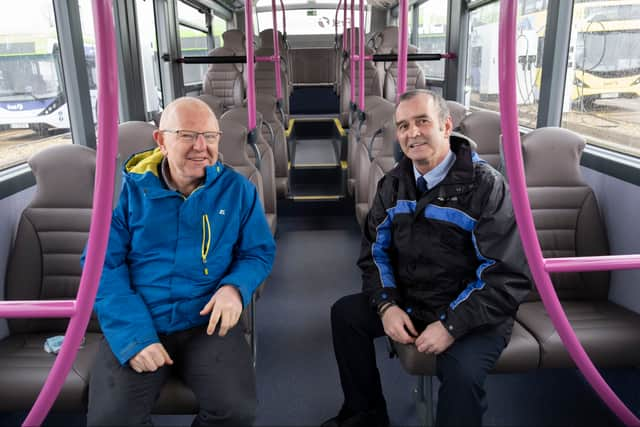Glasgow bus driver reunited with passenger after saving his life
and live on Freeview channel 276
John McCann (62) from the West End of Glasgow, was travelling on the No 57 route from Pollokshaws to Glasgow to meet friends for a game of tennis in April 2021. Having jogged to the bus stop, and with plans to cycle later that day, the last thing he expected was to suffer a cardiac arrest on his journey.
When alerted that a passenger had taken ill, driver William Bell (59) who has worked for First Bus for 11 years, immediately stopped the journey on Pollokshaws Road to provide vital assistance.
What happened?
Advertisement
Hide AdAdvertisement
Hide AdRecalling the event, William said: “My first thought was ‘oh my god’; then my instinct just kicked in. At first, he seemed OK, he was sitting up and could still talk. I saw a passenger with a phone and asked her to phone an ambulance whilst I phoned the depot to alert them of the incident.


“I kept speaking to John, trying to reassure him that he would be OK, but I could tell something was wrong. He was visibly in pain, moving in his chair, struggling to speak and breathe and was quickly getting worse.
“I got him into the recovery position, at which point he was no longer speaking and his lips were turning blue. I started CPR. The whole time I was trying to stay calm and focus on keeping him alive.”
As the other passenger relayed messages from the ambulance call handler to William, he remained calm and performed life-saving CPR for a full 20 minutes, ensuring John remained alive until paramedics arrived on the scene.
Advertisement
Hide AdAdvertisement
Hide AdOn the ambulance’s arrival, William was asked to continue chest compressions for a further 15 minutes, whilst paramedics set up a defibrillator to support John and take him to hospital.
‘Surreal situation’
William, who was previously a lifeguard, said: “I’ve had to perform CPR and resuscitation once in my previous job, but never on any of my buses. My prior experience helped me to not panic and know how to react in a calm way. I just knew it was my responsibility to save this man. I assessed the situation and knew what to do.
“It was a surreal situation, but I did what was needed. With the help of the passenger with the phone, and the call handler, it was a real team effort and we helped to save John’s life.”
What does John remember?
John, who lives an active lifestyle, recalls nothing more than stepping onto the bus and feeling slightly dizzy. He woke up three days later in intensive care in the Queen Elizabeth University Hospital, after being placed in an induced coma.


Advertisement
Hide AdAdvertisement
Hide AdOn speaking with family and medical staff, John learned what happened on his journey.
He said: “I was astonished. It actually took more than a week for it to properly sink in, but when it did, I just felt so relieved that I had been given a second chance. I felt so lucky. If this had happened to me when I was running or on my way to pick up my bike later that day, I would have been alone. I was incredibly lucky to have been in a public place, with someone who could respond knowingly.”
John said: “I had to express my gratitude, to let him know just how thankful I was to have been on his bus. I feel so grateful and I’m still amazed that someone would do what William did for a complete stranger.”
What happened after?
William has since been commended by the ambulance service and by First Bus for his efforts in the incident, and for acting in a calm and efficient manner to support John. When he received the card and learned that John had survived, he decided to reach out to him and the pair had an emotional reunion call.
Advertisement
Hide AdAdvertisement
Hide AdWilliam recalls reaching out to John: “The paramedics contacted First Bus to commend my efforts, and John’s family had reached out to thank me too, but I actually didn’t know the outcome of the situation until I received the card from John himself. I was so gobsmacked, and relieved to know that he was doing so well. I gave him a call, and was so thankful to hear his voice, it was a really emotional phone call for two strangers to have.”
Following the incident, John wanted to reach out to the driver, to thank him for saving him and giving him another chance at life. John took it upon himself to deliver a thank you card which included a heartfelt message and gift as a token of gratitude, directly to the First Bus Depot, to ensure William received it.
John said: “I couldn’t believe how emotional he sounded. He sounded grateful and relieved that I had made it and was healthy. I’m so appreciative that someone can care for a stranger like that, it’s a real sign of a truly incredible character.”
Since the incident, John has had a cardioverter-defibrillator (ICD) fitted, a device able to perform cardioversion, defibrillation and pacing of the heart and can correct most life-threatening cardiac arrhythmias.
Advertisement
Hide AdAdvertisement
Hide AdSuffering from a condition called Atrial fibrillation, which can cause irregular and rapid heart rhythm and is quite common in older males, John said this is the first time he’s had a real health scare.
Making a recovery
Shortly after John’s incident, Footballer Christian Eriksen collapsed on the pitch during the Euro’s, also suffering from a cardiac arrest.
John said: “Myself and Christian Eriksen have a lot in common, other than the football ability of course! But, joking aside, the publicity around what happened to him really highlights these things can happen to anyone, at any age, no matter how active or fit they may be. It’s so important that people are trained in first aid. It really is a matter between life and death. My story might not be on the same scale as Eriksen’s, but if it can help raise awareness and save a life, it’s something”.
William added: “The whole thing has been a huge eyeopener. It took me back to my days as a lifeguard and reminded me how important it is to know how to react in these types of situations, especially when you’re working with the public every day. You need to know what to do to help those in need. I’ve never experienced anything like this in all my years working on the buses, but I’m so glad I was there to help John.”
Advertisement
Hide AdAdvertisement
Hide AdJohn said: “I’m back to living my active lifestyle, I love cycling and I’ve done a lot of it since my cardiac arrest – I even cycled 150 miles in three days with some of my friends! I’m back playing tennis two to three times a week and I go to regular spin classes. I’m just making the most of life. What happened has really made me realise life is short, you don’t know what’s around the corner.
“I’m so grateful to still be here to see my family progress. My daughter is studying to be a doctor and my son has just finished an apprenticeship with a financial services company – I’m so thrilled to be living my life, spending time with my family and seeing them live theirs!”
Comment Guidelines
National World encourages reader discussion on our stories. User feedback, insights and back-and-forth exchanges add a rich layer of context to reporting. Please review our Community Guidelines before commenting.
